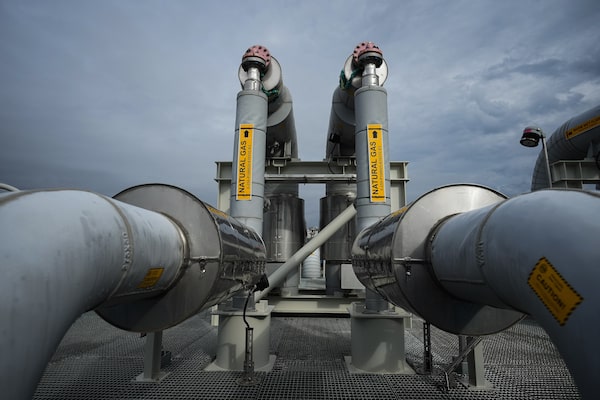
Piping on the top of a receiving platform which will be connected to the Coastal GasLink natural gas pipeline terminus, in Kitimat, B.C., on Sept. 28, 2022.DARRYL DYCK/The Canadian Press
Coastal GasLink, a natural gas pipeline partnership operated by Calgary-based TC Energy Corp. TRP-T, is seeking $1.2-billion from one of its main contractors for construction delays and may be liable for a similar amount if an arbitrator rules against it, court documents showed ahead of a hearing this month.
Construction of $14.5-billion Coastal GasLink (CGL), which TC began planning in 2012, finished in October at more than double its original budget. Private equity firm KKR & Co. and Alberta pension manager Alberta Investment Management Corporation (AIMCo) jointly own 65 per cent of the limited partnership and TC owns the remaining 35 per cent.
The dispute over the project that will supply Canada’s first liquefied natural gas export facility around 2025 highlights the extreme difficulties operators face in building Canadian pipelines. The Canadian government-owned Trans Mountain pipeline expansion, which aims to boost oil exports, has also faced delays and soaring costs.
The 670-kilometre CGL through British Columbia’s Rocky Mountains to the Pacific coast was delayed by mudslides, a six-month pandemic work stoppage, sometimes violent protests and steep terrain that forced TC to use ski lifts to transport pipe.
CGL also terminated contractor Pacific Atlantic Pipeline Construction’s (PAPC) contract last year alleging poor performance and is claiming $1.2-billion for the cost of finding new contractors, Blaine Trout, TC’s vice-president in charge of CGL, said in court on Nov. 17.
The two parties have gone to court in Alberta with CGL arguing it is legally entitled to draw on a $117-million letter of credit, issued by HSBC to CGL as a performance guarantee for PAPC.
The Alberta court case comes ahead of the two parties facing off in International Chamber of Commerce arbitration in November, 2024, over whether PAPC defaulted on its contract or was wrongfully terminated.
On Oct. 19, an Alberta court granted an injunction request from PAPC and its parent company, Italian contractor Bonatti, forcing CGL to withdraw its call on the letter of credit, pending the Dec. 19 hearing. The letter of credit expires in early 2024.
TC said in a statement that the cost of PAPC’s alleged failure to perform significantly exceeds the amount of the letter of credit.
“Coastal GasLink is committed to enforcing its contractual rights and is actively pursuing cost recoveries as it is entitled to,” TC Energy said.
PAPC alleges its work was undermined by CGL’s thousands of design changes during construction and protests that CGL could not control.
Greg Cano, PAPC’s chief operations officer, told Reuters that TC tried to force PAPC to accelerate construction, which would have required the contractor to almost double its staffing and equipment on site, without paying for the extra cost.
Mr. Cano, who previously worked for TC, said he has never seen such a dispute in his 45 years building pipelines.
If the Alberta judge allows CGL to call the letter of credit, financial losses to PAPC and Bonatti could snowball, the companies said in court.
They may be unable to pay the cost of arbitration, complete current projects or bid on others, resulting in PAPC’s possible insolvency, Bonatti chief executive Andrea Colombo said in an affidavit.
PAPC is seeking up to $1-billion in its arbitration proceeding.
KKR and AIMCo referred requests for comment to TC.
CGL will likely provide little financial return to TC after impairments, TC’s chief financial officer said in November. TC does not expect current or potential legal proceedings to have a material impact, according to its 2022 annual report.